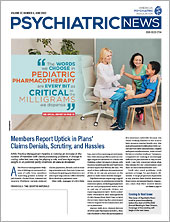During a recent congressional hearing, Rep. Ann Eshoo (D-Calif.) bluntly described the state of the mental health system in the United States: It is inadequate. This is due to insufficient insurance coverage, limited access because of poor provider reimbursement, and an aging system that too often relies on jails and shelters, she explained.
But numerous bills are currently before Congress that attempt to address many of the problems plaguing the mental health system. During a hearing titled “Communities in Need: Legislation to Support Mental Health and Well-Being,” the Subcommittee on Health of the Committee on Energy and Commerce reviewed 19 of those bills. Eshoo is the subcommittee’s chair.
Incoming APA President Rebecca Brendel, M.D., J.D., provided expert testimony to the subcommittee, answering several questions and emphasizing the importance of adequately funding the nation’s mental health system, enforcing the Mental Health Parity and Addiction Equity Act of 2008 (MHPAEA), and integrating mental health and primary care.
During the hearing, the subcommittee focused on reauthorizations for several mental and substance use disorder programs that fall under the Public Health Service Act, such as the Community Mental Health Services Block Grant and programs within the National Mental Health and Substance Use Policy Laboratory. Brendel applauded that work and emphasized that “the programs must be reauthorized at levels that better address the years of underfunding of public mental health programs.”
She also outlined several other APA-endorsed bills that would help address the nation’s ongoing mental health and substance use disorder crises:
•
The 988 and Parity Assistance Act of 2022 (HR 7232), introduced by Reps. Tony Cardenas (D-Calif.) and Brian Fitzpatrick (R-Pa.), would authorize grant funding to state insurance departments to help them implement and enforce MHPAEA. “Congressional action is clearly needed to bring insurers into compliance with the parity law,” Brendel told the subcommittee.
•
The Mental Health Justice and Parity Act of 2022 (HR 7254), introduced by Reps. Katie Porter (D-Calif.) and Debbie Dingell (D-Mich.), would prohibit nonfederal governmental health plans from opting out of parity law coverage requirements.
•
The Collaborate in an Orderly and Cohesive Manner Act (HR 5218), introduced by Reps. Lizzie Fletcher (D-Tex.) and Jaime Herrera Beutler (R-Wash.), would expand access to quality mental health care through the collaborative care model (CoCM) by providing grants to primary care practices to cover startup costs and by establishing technical assistance centers to implement CoCM. Brendel explained that CoCM is supported by more than 90 high-quality studies, and its population-based approach helps to alleviate the psychiatric workforce shortage.
Brendel was joined on her panel by Sandy Chung, M.D., president-elect of the American Academy of Pediatrics; Steven Adelsheim, M.D., a clinical professor of psychiatry and director of the Stanford Center for Youth Mental Health and Wellbeing and a member of APA’s Council on Children, Adolescents, and Their Families; Cassandra Price, M.B.A., director of the Office of Addictive Diseases with the Georgia Department of Behavioral Health and Developmental Disabilities; Debra Pinals, M.D., medical director of behavioral health and forensic programs with the Michigan Department of Health and Human Services and chair of APA’s Council on Psychiatry and Law; and LeVail Smith, C.P.S.S., peer support specialist instructor and mentor.
In her written testimony, Brendel referenced numerous additional bills that APA supports and the subcommittee reviewed during the hearing. She also fielded several questions from subcommittee members, particularly around collaborative care and mental health parity.
Especially in light of the COVID-19 pandemic, ensuring mental health parity is more important than ever, she pointed out. While frontline workers are in serious need of quality mental health care, many are covered under health plans that do not provide coverage for mental health treatment, Brendel explained. “The Mental Health Justice and Parity Act of 2022 would ensure that our nation’s frontline workers have comprehensive access to mental health services,” she said.
Additionally, Fletcher asked Brendel to explain what makes CoCM different from other integrated behavioral health models.
“The Collaborative Care Model enables a single psychiatrist to work alongside a care manager and a primary care doctor to provide consultation,” Brendel said. Rather than seeing four to six patients in one or two hours, in this model psychiatrists can provide consultation to as many as 50 to 70 patients in the same amount of time. Brendel detailed other benefits of CoCM, such as reducing the stigma of requiring patients to make separate mental health appointments and helping to save costs. “It really is a model that has everything and can be implemented very quickly within the existing workforce,” she said.
It is vitally important that behavioral and primary care become integrated, Brendel said. “Population- and evidence-based integrated care models hold great promise to enhance access for the millions of Americans who struggle with undiagnosed and untreated mental health and substance use disorders.” ■

